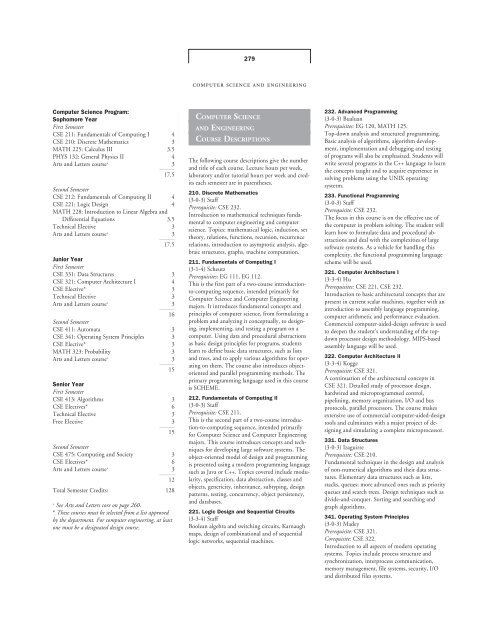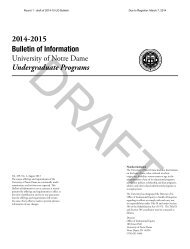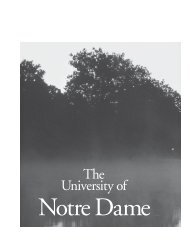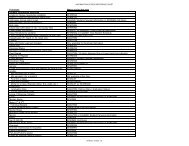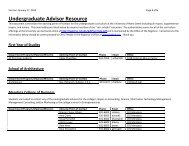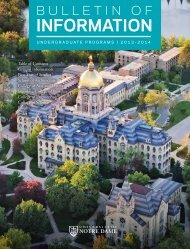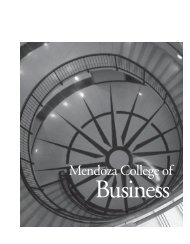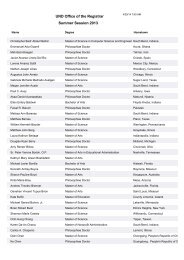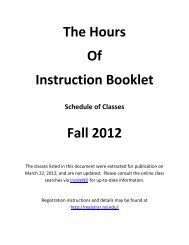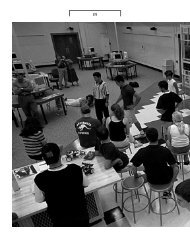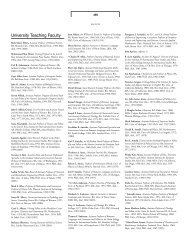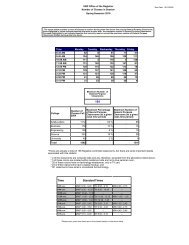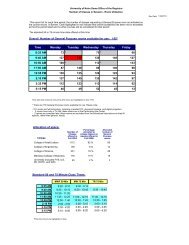258-287p 07. Engr 02-03 - Registrar - University of Notre Dame
258-287p 07. Engr 02-03 - Registrar - University of Notre Dame
258-287p 07. Engr 02-03 - Registrar - University of Notre Dame
You also want an ePaper? Increase the reach of your titles
YUMPU automatically turns print PDFs into web optimized ePapers that Google loves.
279<br />
COMPUTER SCIENCE AND ENGINEERING<br />
Computer Science Program:<br />
Sophomore Year<br />
First Semester<br />
CSE 211: Fundamentals <strong>of</strong> Computing I 4<br />
CSE 210: Discrete Mathematics 3<br />
MATH 225: Calculus III 3.5<br />
PHYS 132: General Physics II 4<br />
Arts and Letters course + 3<br />
—————<br />
17.5<br />
Second Semester<br />
CSE 212: Fundamentals <strong>of</strong> Computing II 4<br />
CSE 221: Logic Design 4<br />
MATH 228: Introduction to Linear Algebra and<br />
Differential Equations 3.5<br />
Technical Elective 3<br />
Arts and Letters course + 3<br />
—————<br />
17.5<br />
Junior Year<br />
First Semester<br />
CSE 331: Data Structures 3<br />
CSE 321: Computer Architecture I 4<br />
CSE Elective* 3<br />
Technical Elective 3<br />
Arts and Letters course + 3<br />
—————<br />
16<br />
Second Semester<br />
CSE 411: Automata 3<br />
CSE 341: Operating System Principles 3<br />
CSE Elective* 3<br />
MATH 323: Probability 3<br />
Arts and Letters course + 3<br />
—————<br />
15<br />
Senior Year<br />
First Semester<br />
CSE 413: Algorithms 3<br />
CSE Electives* 6<br />
Technical Elective 3<br />
Free Elective 3<br />
—————<br />
15<br />
Second Semester<br />
CSE 475: Computing and Society 3<br />
CSE Electives* 6<br />
Arts and Letters course + 3<br />
—————<br />
12<br />
Total Semester Credits: 128<br />
+<br />
See Arts and Letters core on page 260.<br />
* These courses must be selected from a list approved<br />
by the department. For computer engineering, at least<br />
one must be a designated design course.<br />
COMPUTER SCIENCE<br />
AND ENGINEERING<br />
COURSE DESCRIPTIONS<br />
The following course descriptions give the number<br />
and title <strong>of</strong> each course. Lecture hours per week,<br />
laboratory and/or tutorial hours per week and credits<br />
each semester are in parentheses.<br />
210. Discrete Mathematics<br />
(3-0-3) Staff<br />
Prerequisite: CSE 232.<br />
Introduction to mathematical techniques fundamental<br />
to computer engineering and computer<br />
science. Topics: mathematical logic, induction, set<br />
theory, relations, functions, recursion, recurrence<br />
relations, introduction to asymptotic analysis, algebraic<br />
structures, graphs, machine computation.<br />
211. Fundamentals <strong>of</strong> Computing I<br />
(3-1-4) Scheutz<br />
Prerequisites: EG 111, EG 112.<br />
This is the first part <strong>of</strong> a two-course introductionto-computing<br />
sequence, intended primarily for<br />
Computer Science and Computer Engineering<br />
majors. It introduces fundamental concepts and<br />
principles <strong>of</strong> computer science, from formulating a<br />
problem and analyzing it conceptually, to designing,<br />
implementing, and testing a program on a<br />
computer. Using data and procedural abstractions<br />
as basic design principles for programs, students<br />
learn to define basic data structures, such as lists<br />
and trees, and to apply various algorithms for operating<br />
on them. The course also introduces objectoriented<br />
and parallel programming methods. The<br />
primary programming language used in this course<br />
is SCHEME.<br />
212. Fundamentals <strong>of</strong> Computing II<br />
(3-0-3) Staff<br />
Prerequisite: CSE 211.<br />
This is the second part <strong>of</strong> a two-course introduction-to-computing<br />
sequence, intended primarily<br />
for Computer Science and Computer Engineering<br />
majors. This course introduces concepts and techniques<br />
for developing large s<strong>of</strong>tware systems. The<br />
object-oriented model <strong>of</strong> design and programming<br />
is presented using a modern programming language<br />
such as Java or C++. Topics covered include modularity,<br />
specification, data abstraction, classes and<br />
objects, genericity, inheritance, subtyping, design<br />
patterns, testing, concurrency, object persistency,<br />
and databases.<br />
221. Logic Design and Sequential Circuits<br />
(3-3-4) Staff<br />
Boolean algebra and switching circuits, Karnaugh<br />
maps, design <strong>of</strong> combinational and <strong>of</strong> sequential<br />
logic networks, sequential machines.<br />
232. Advanced Programming<br />
(3-0-3) Bualuan<br />
Prerequisites: EG 120, MATH 125.<br />
Top-down analysis and structured programming.<br />
Basic analysis <strong>of</strong> algorithms, algorithm development,<br />
implementation and debugging and testing<br />
<strong>of</strong> programs will also be emphasized. Students will<br />
write several programs in the C++ language to learn<br />
the concepts taught and to acquire experience in<br />
solving problems using the UNIX operating<br />
systetm.<br />
233. Functional Programming<br />
(3-0-3) Staff<br />
Prerequisite: CSE 232.<br />
The focus in this course is on the effective use <strong>of</strong><br />
the computer in problem solving. The student will<br />
learn how to formulate data and procedural abstractions<br />
and deal with the complexities <strong>of</strong> large<br />
s<strong>of</strong>tware systems. As a vehicle for handling this<br />
complexity, the functional programming language<br />
scheme will be used.<br />
321. Computer Architecture I<br />
(3-3-4) Hu<br />
Prerequisites: CSE 221, CSE 232.<br />
Introduction to basic architectural concepts that are<br />
present in current scalar machines, together with an<br />
introduction to assembly language programming,<br />
computer arithmetic and performance evaluation.<br />
Commercial computer-aided-design s<strong>of</strong>tware is used<br />
to deepen the student’s understanding <strong>of</strong> the topdown<br />
processor design methodology. MIPS-based<br />
assembly language will be used.<br />
322. Computer Architecture II<br />
(3-3-4) Kogge<br />
Prerequisite: CSE 321.<br />
A continuation <strong>of</strong> the architectural concepts in<br />
CSE 321. Detailed study <strong>of</strong> processor design,<br />
hardwired and microprogrammed control,<br />
pipelining, memory organization, I/O and bus<br />
protocols, parallel processors. The course makes<br />
extensive use <strong>of</strong> commercial computer-aided-design<br />
tools and culminates with a major project <strong>of</strong> designing<br />
and simulating a complete microprocessor.<br />
331. Data Structures<br />
(3-0-3) Izaguirre<br />
Prerequisite: CSE 210.<br />
Fundamental techniques in the design and analysis<br />
<strong>of</strong> non-numerical algorithms and their data structures.<br />
Elementary data structures such as lists,<br />
stacks, queues; more advanced ones such as priority<br />
queues and search trees. Design techniques such as<br />
divide-and-conquer. Sorting and searching and<br />
graph algorithms.<br />
341. Operating System Principles<br />
(3-0-3) Madey<br />
Prerequisite: CSE 321.<br />
Corequisite: CSE 322.<br />
Introduction to all aspects <strong>of</strong> modern operating<br />
systems. Topics include process structure and<br />
synchronization, interprocess communication,<br />
memory management, file systems, security, I/O<br />
and distributed files systems.


